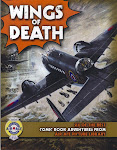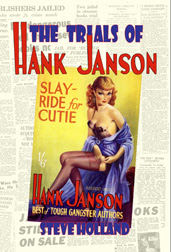 Now completely forgotten, Percy Montague Baker was the author in the 1920s of a series of three well-illustrated young people’s books about mechanical engineering.
Now completely forgotten, Percy Montague Baker was the author in the 1920s of a series of three well-illustrated young people’s books about mechanical engineering.Percy Baker was born in Birmingham in 1872, the son of gunmaker John Richard Baker. He was educated at Mason College, Birmingham and received his technical education at the Municipal Technical College, in the workshops of which he also received part of his practical training, the remainder being obtained in his father's gun factory in Birmingham. In 1901 he graduated with first-class honours at the University of London, and thereafter devoted several years to the teaching of engineering subjects in technical schools in West Bromwich and Wolverhampton. He was married to Elsie Scott of Edinburgh.
 He joined the Electric Power Engineering Company, Birmingham, as a designer in 1908, and became an Associate of the Institution of Mechanical Engineers in 1909; he was also an Associate of the Institution of Electrical Engineers and a Member of the Institute of Fuel. In 1911 he was appointed professor of electrical engineering and physics at the Victoria Technical Institute, (Central Technological College) of Bombay Presidency, at Byculla, and reorganized the engineering syllabus, developing particularly the practical course work. He was Inspector of Technical Schools in the Presidency and he also practised as a consulting engineer, mainly for the electrification of Bombay cotton mills.
He joined the Electric Power Engineering Company, Birmingham, as a designer in 1908, and became an Associate of the Institution of Mechanical Engineers in 1909; he was also an Associate of the Institution of Electrical Engineers and a Member of the Institute of Fuel. In 1911 he was appointed professor of electrical engineering and physics at the Victoria Technical Institute, (Central Technological College) of Bombay Presidency, at Byculla, and reorganized the engineering syllabus, developing particularly the practical course work. He was Inspector of Technical Schools in the Presidency and he also practised as a consulting engineer, mainly for the electrification of Bombay cotton mills.In 1916 he returned to England and, volunteering for war service, joined the Ministry of Munitions, for whom he undertook the training of men and women for the workshops. He set up a series of instructional factories for the purpose, and after the war he joined the Ministry of Labour as Director and then Inspector of instructional factories; these numbered 60, and had accommodation for the training of 20,000 disabled ex-service men. He was appointed MBE for his services. He was also a technical Advisor to the Institute of Patentees.
He was mains superintendent for the Borough of Chiswick between 1923 and 1927 and was deputy electrical engineer for the Borough at the time of his death, which occurred at Chiswick on 23rd August 1935, at the age of 62.
According to Who Was Who he was a good sportsman.
 Baker was the author of a series of three illustrated books about mechanical engineering and machines. He wrote no other books, nor, so far as is known, was he a contributor to boys’ magazines. The first was illustrated with line drawings by the author, T. E. Heywood, Robert Barnard Way, and H. Hugh Ashley. The two succeeding volumes were illustrated entirely by Way, who was at the start of his career as an technical artist and writer.
Baker was the author of a series of three illustrated books about mechanical engineering and machines. He wrote no other books, nor, so far as is known, was he a contributor to boys’ magazines. The first was illustrated with line drawings by the author, T. E. Heywood, Robert Barnard Way, and H. Hugh Ashley. The two succeeding volumes were illustrated entirely by Way, who was at the start of his career as an technical artist and writer.Baker set out with the idea of giving some idea of the work of the engineer and his value to the community, ‘as an uncle might explain things to his nephew’, and initially aimed to write one book for the boy who was just about to leave school, which at that time was when he reached fourteen years of age. He found it impracticable to give a useful idea of the engineer’s work in one volume, so wrote two more. Topics covered are wide-ranging, including transport, prime-movers, manufacture, electricity, the telegraph, telephone and wireless, and workshop practice.
In contrast to the usual run of popular books on engineering of the time he did not touch on the history, since this was too well-known. Instead he wrote about the World of the Machine as it had come to be after the First World War. Much of the information he used was gathered from technical journals, which the general public would not usually read.
 The range of technical information covered is impressive, and the quality and standard of the writing says much for the high standard of literacy of the readership aimed for. The line drawings are clear and informative. In contrast to modern children’s books covering technology, which rely on many coloured illustrations and snappy captions, these are text-heavy. They were a first-class introduction to any boy who wished to take up mechanical engineering as a career. Needless to say, Baker does not appear on modern academic studies of children’s books.
The range of technical information covered is impressive, and the quality and standard of the writing says much for the high standard of literacy of the readership aimed for. The line drawings are clear and informative. In contrast to modern children’s books covering technology, which rely on many coloured illustrations and snappy captions, these are text-heavy. They were a first-class introduction to any boy who wished to take up mechanical engineering as a career. Needless to say, Baker does not appear on modern academic studies of children’s books.The following list of Baker’s writings is taken from the online British Library Catalogue. No additional titles were found on ABE, COPAC or WorldCat.
The World of Machines. London, Wells Gardner, Darton & Co, 1927.
More Machines. London, Wells Gardner, Darton & Co, 1929.
Still more Machines. London, Wells Gardner, Darton & Co, 1930.
Various unidentified pamphlets on labour training.
Sources:
Obituary, Proceedings of the Institution of Mechanical Engineers, vol.130, 1935, pp 524-525.
‘Baker, Percy M.’, Who Was Who, A & C Black, 1920-2007; online edition, Oxford University Press, Dec 2007. [Accessed 5 Oct 2008]























































No comments:
Post a Comment